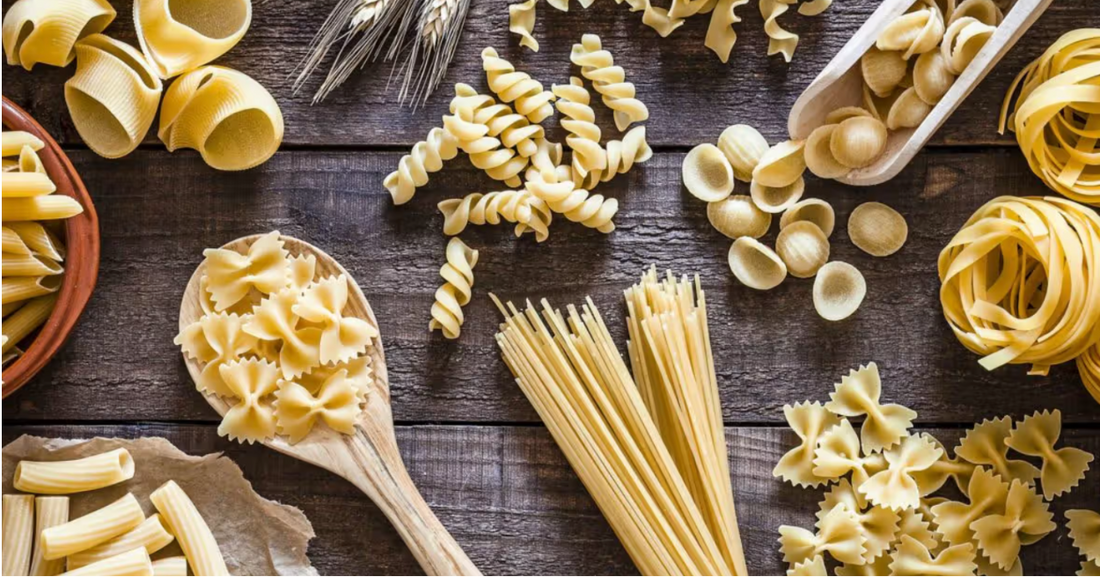
Is Pasta Good for Health? Exploring Benefits and Myths
Is Pasta Really That Bad?
If you love pasta but feel guilty every time you eat it, you're not alone. Pasta has been wrongly demonized for years, being blamed for weight gain, high carb intake, and even blood sugar spikes.
But is pasta that bad, or are we just eating it in the wrong way?
Here's a funny fact: Italians eat more pasta than any other nation—its citizens average 23.2 kilograms of pasta a year. Yet, Italy has one of the lowest obesity rates in Europe. This indicates that the pasta isn't a problem, but how we prepare and eat it is.
So, is pasta good for health? Let's go deep and explore the science behind it, debunk common myths, and discover how to enjoy pasta without guilt.
Nutritional Profile of Pasta
Pasta is not all about carbs; it is actually a nutrient-rich food that can be a great part of a balanced diet if it is consumed in the right way.
Let's break down its components:
- Carbohydrates: Yes, it contains high carbs, but not all carbs are bad! Whole-grain and fiber-rich pasta provide slow-digesting complex carbs, which release energy gradually.
- Protein: Did you know a cup of cooked pasta will give you about 7-8 grams of protein? That's more than what you would expect from a grain-based food!
- Fiber (Whole-Grain Pasta): Whole-wheat or legume-based pasta is high in fiber, which aids good digestion and results in a healthy gut.
- Essential Nutrients: Pasta is fundamentally a low-fat food and an excellent source of essential nutrients, such as –
-
-
B Vitamins are necessary for energy production.
-
Iron which transports oxygen in the blood around the human body
-
Folate helps your body carry out heaps of different cell growths and functions.
-
Health Benefits of Eating Pasta
Well now comes the beneficial part, of how pasta becomes nutritious if at all when done appropriately. Let’s see how:
1. Long-lasting Energiser
Pasta has a low to medium glycemic index, meaning it provides sustained energy without spiking blood sugar levels. That is why athletes often load up on pasta before an event—it's a fantastic fuel source!
2. Encourages Healthy Eating Habits
Pasta is a great "vehicle" for nutritious ingredients. Pairing it with lean proteins (like chicken or fish), vegetables, and olive oil increases its nutritional value, making it part of a balanced meal.
3. Helps Support Heart Health
Whole-wheat pasta includes heart-friendly fiber that can lower cholesterol levels. It's also naturally low in fat and sodium, making it a great choice for those looking to improve cardiovascular health.
4. Aids in Weight Management
There is no inevitable weight gain due to the consumption of pasta, contrary to popular belief. Observational studies show that individuals who have pasta as part of the Mediterranean diet, in moderation, were less likely to become overweight. The key lies in moderation and a selection of whole grains.
5. Aids Digestion
Fibe-rich pasta, such as whole wheat, chickpea, or lentil pasta, will feed the good gut bacteria and promote their health. It is good for digestion, will eliminate constipation, and maintain digestive health.
Common Myths About Pasta – Debunked!
Myth 1: Pasta Makes You Fat
Reality: There is nothing wrong with pasta; the problem arises from overeating it and loading the dish with heavy, creamy sauces that make all those extra calories irrelevant.
Myth 2: All Pasta is Bad for Blood Sugar
Reality: Whole-grain pasta has a lower glycemic index than white pasta, thus is a better choice in controlling blood sugar. Pasta that is cooked al dente also has a lower GI, meaning less impact on blood sugar.
Myth 3: Gluten in Pasta is Unhealthy for Everyone
Reality: There's no need to be afraid of gluten unless you have celiac disease or are gluten-sensitive. You can find gluten-free pasta, but regular pasta is not bad for most individuals.
How to Make Pasta Healthier? Smart Eating Tips
Incorporating pasta into your diet in the right way will give you the best health benefits while still being light and nutritious. Here it goes:
Choose Whole-Grain or Legume Pasta – These varieties will pack more fiber and protein than their refined counterparts.
Control Your Portions – Keep to about 1 cup of cooked pasta per serving—about the size of your fist.
Team it with Healthy Ingredients – Add lean proteins (chicken, shrimp, tofu), some fiber-rich veggies (spinach, tomatoes, zucchini), and healthy fats (olive oil, nuts, seeds) to make it a well-rounded meal.
Cook Pasta "Al Dente" – Overcooked pasta has a higher glycemic index. Keeping it firm (al dente) slows digestion and improves blood sugar control.
Skip Creamy Sauces – Instead, go for tomato-based sauces, pesto, or olive oil with herbs for a lower-calorie and nutrient-packed dish.
Want to explore various types & styles of pasta and try the recipes? Here’s an interesting guide to different types of pasta for you!
Unique Insight: Pasta and Mental Well-being
Pasta is more than just food, it's comfort on a plate. Some studies do show that carbs help raise serotonin levels, the hormone associated with feelings of happiness and calmness. So, that bowl of pasta can pick up your mood!
Most cultures, especially those in Italy and the Mediterranean region, adopt pasta as part of a social and family-oriented way of dining. The joy of sharing a meal reduces stress and enhances overall well-being.
Final Verdict: Is Pasta Good for Health?
Yes! Pasta can be good for health if it is eaten in moderation and combined with the right ingredients. It provides:
- Sustained energy
- Essential nutrients
- Benefits of weight management
- Heart health
- Gut health,
- Mental well-being.
The key is balance. Instead of being fearful of pasta, learn to enjoy it more healthily: choose whole grains, add vegetables, and avoid excessive cream-based sauces.
Now, the next time someone tells you to forego the pasta, you can boldly respond with, "Pasta isn't the problem—how you eat it is!"
Sounds interesting? Try out the best pasta-making workshop in Delhi by Vivre Experiences and learn more about all of it!
FAQs
Q1.. Is pasta that bad for you?
Ans1.Not by a long way! Pasta is rich in energy, fiber (when wholegrain), and nutrients. The secret is balance and clever ingredients.
Q2.. Does pasta cause you to become fat?
Ans2.The pasta itself is not the enemy, big portions and rich sauces are. In portioned control and as part of a generally balanced meal, pasta won't make you fat.
Q3.. Is all pasta harmful for blood sugar?
Ans3.Nope! Whole-grain pasta is lower on the glycemic index, so it's digested more slowly and maintains blood sugar stable. Boiling pasta al dente also retards its effect on blood sugar.
Q4.. Can I eat pasta when I'm trying to lose weight?
Ans4.Yes! Science indicates that pasta in a Mediterranean diet can help you maintain weight. Just keep portion sizes in check and serve it with lean proteins, vegetables, and good fats.
Q5. Is pasta gluten bad for everyone?
Ans5.No, unless you are gluten intolerant or you have celiac disease. If you must substitute, use gluten-free pasta that is made from chickpeas, lentils, or quinoa.
Q6. How do I eat pasta healthfully?
Ans6.Have whole-grain or legume pasta, keep portions in check, and top with vegetables, lean protein, and healthy fats rather than heavy cream sauces.
Q7.. Why do Italians consume so much pasta and remain healthy?
Ans7.Italians are all about portion control and balance. They serve pasta with olive oil, vegetables, and lean meats instead of burying it in heavy sauces. And they savor their meals, too!
Q8.. Is pasta healthy?
Ans8.Yes, absolutely! Pasta provides complex carbohydrates for energy, protein, fiber (when whole grain), and key nutrients such as B vitamins, iron, and folate.
Q9.. Is pasta good for digestion?
Ans9.Yes! Whole-wheat, chickpea or lentil pasta is full of fiber, which keeps the digestive system healthy, keeps constipation at bay, and nourishes good gut bacteria.
Q10.. Can pasta really boost my mood?
Ans10.Surprisingly, yes! Carbs, such as those found in pasta, actually boost serotonin, the "happiness" hormone, production, which can enhance mood and alleviate stress.
